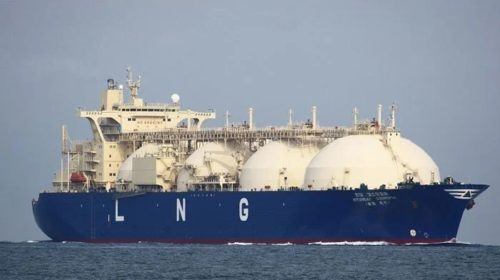In a welcoming development, the coalition government has done away with all the hurdles that had delayed the construction of four LNG terminals during the PTI government’s tenure, a senior official told The News.
“Ahead of prime minister’s visit to Qatar, the ECC has amended the LNG Policy 2001 for exemption from mandatory Third Party-Access (TPA) to new LNG terminals to ensure sizeable foreign direct investment from Qatar in the Energas Terminal,” said the official.
Pakistan currently has the capacity to import 1.2 bcfd LNG. But in the wake of dwindling local gas reserves by 9-10 percent every year, the country’s immediate gas demand stands at 3 bcfd, whereas its constrained demand has jacked up to 6 bcfd. Pakistan is left with the only option to increase its reliance on imported gas till a huge discovery like Sui Gas find.
Among the proposed four terminals, Energas Terminal is the one having 49 percent FDI from Qatar. In the Energas Terminal, Pakistani shareholders include Lucky Group, Sapphire Group and Halmore Power. Qatar is the single largest shareholder in the project.
The new terminals, once built, will be operated without any off-take guarantees or capacity payments from the Government of Pakistan. The new four LNG terminals include Tabeer Energy, Energas, Pakistan Gas Port Consortium Limited (PGPCL)-2 and GEI Pakistan.
“We have removed all the impediments and fully facilitated the investors. Now, it’s up to them how fast they develop the LNG terminal facilities. All the new LNG operators will arrange LNG supply on their own and sell it to the private sector after regasification. However, they will use the gas pipeline infrastructure for transportation of their product to their clients”, the official said.
The new LNG terminals such as Energas and Tabeer have already been allotted the pipeline capacity and approved by the cabinet. More importantly, the coalition government has also changed the LNG policy 2001 to fully facilitate the new LNG terminals.
Energas is currently engaged with the Pakistan government and its entities for the development of additional LNG terminals on the “merchant model” as against the existing two terminals set up under government guarantees and processing fees.
The terminal development project dates back to 2016. Merchant terminals have been in pipeline for the last seven years. But, lack of government facilitation is one of the key reasons for the inability of private sector to move ahead. The biggest challenge has been the Sui Gas companies’ monopolies creating significant roadblocks in assigning pipeline capacities for the private terminals.
If the private terminals would have been given a go-ahead, Pakistan would have been able to secure five additional cargoes at rates of $5-7. The Energas Terminal has its own private shareholders’ demand for gas which includes power, cement, automobile, textile, chemicals and real estate. Their own captive demand is the reason why they have been trying to build their own terminal.
The Qatari government, according to other official sources, made several phone calls to the previous government complaining of a significant lack of progress on their terminal development. Amongst the issues highlighted by Qatari leadership was a level-playing field at ports, pipeline capacity from Sui companies and enabling regulations at the OGRA level.
After the Ukraine war, the German government gave approval within six months to four new terminals, while Qatar has been trying for years to develop the terminal in Pakistan. This trip is an important test for the new government to see if they can facilitate the much-needed Qatari investment in Pakistan. The ECC decision for regulatory clarity is only one of the items requested by Qatar. They, however, are still awaiting for a positive response on other items which need clarification from the Ministry of Maritime Affairs, Sui Gas companies and Ministry of Finance. “If this chance is missed, Pakistan may not be able to develop a terminal for the next many years and will be hounded by a significant shortage of gas,” sources said.
Qatar has already received regulatory approval to secure the company shares, but it still awaiting the government’s support for its outstanding items from the three ministries (Petroleum/Sui, Maritime and Finance). The officials hope that all these issues will be resolved before the visit of prime minister to Qatar.
When asked about the change in LNG policy 2001, he said the government has replaced Article 6.2(a) of the LNG Policy, 2011 with amendments that provide Third-Party-Access (TPA) to new LNG terminals and associated facilities developed by the private sector without any government guarantees or off-take commitments on optional basis on a negotiated tariff with first right of use for terminal developers, operators and their associated undertakings. This optional TPA will be for a period of 20 years from the date of commencement of construction. Thereafter, every terminal will be subject to mandatory TPA, whether it is regulated TPA or negotiated TPA, following the principle of use-it-or-lose-it (UIOLI).
Furthermore, terminal developers, operators and associated undertakings will submit relevant information to the Oil & Gas Regulatory Authority (Ogra) for information and market monitoring, including capacity utilisation and terminal tariff (only in the case of TPA). The TPA for the unused capacity of LNG terminals contracted by public sector entities will be mandatory and regulated by OGRA.







